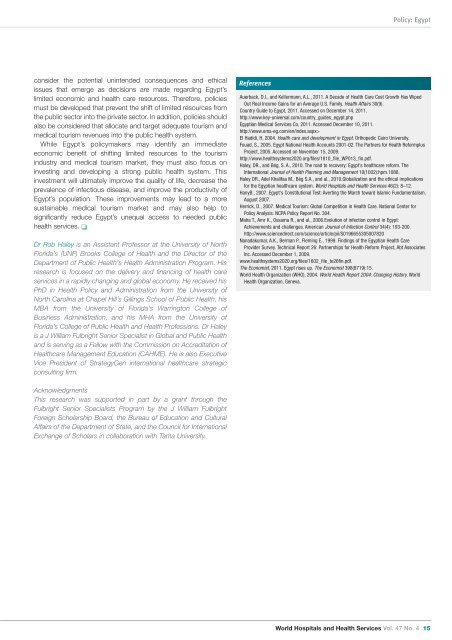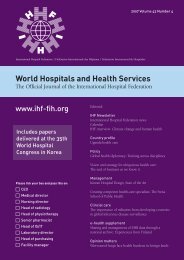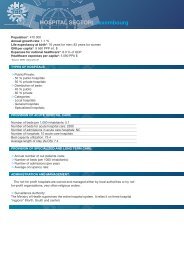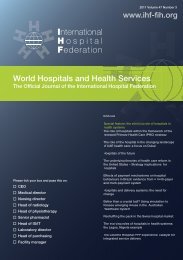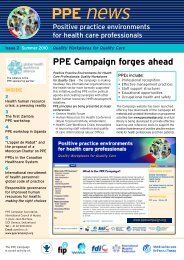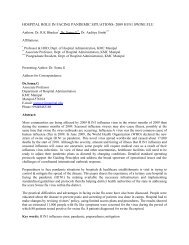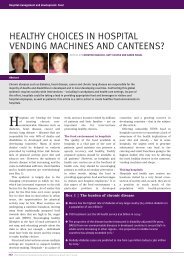web_vol47 4.pdf - International Hospital Federation
web_vol47 4.pdf - International Hospital Federation
web_vol47 4.pdf - International Hospital Federation
Create successful ePaper yourself
Turn your PDF publications into a flip-book with our unique Google optimized e-Paper software.
Policy: Egypt<br />
consider the potential unintended consequences and ethical<br />
issues that emerge as decisions are made regarding Egypt’s<br />
limited economic and health care resources. Therefore, policies<br />
must be developed that prevent the shift of limited resources from<br />
the public sector into the private sector. In addition, policies should<br />
also be considered that allocate and target adequate tourism and<br />
medical tourism revenues into the public health system.<br />
While Egypt’s policymakers may identify an immediate<br />
economic benefit of shifting limited resources to the tourism<br />
industry and medical tourism market, they must also focus on<br />
investing and developing a strong public health system. This<br />
investment will ultimately improve the quality of life, decrease the<br />
prevalence of infectious disease, and improve the productivity of<br />
Egypt’s population. These improvements may lead to a more<br />
sustainable medical tourism market and may also help to<br />
significantly reduce Egypt’s unequal access to needed public<br />
health services. ❏<br />
Dr Rob Haley is an Assistant Professor at the University of North<br />
Florida’s (UNF) Brooks College of Health and the Director of the<br />
Department of Public Health's Health Administration Program. His<br />
research is focused on the delivery and financing of health care<br />
services in a rapidly changing and global economy. He received his<br />
PhD in Health Policy and Administration from the University of<br />
North Carolina at Chapel Hill’s Gillings School of Public Health, his<br />
MBA from the University of Florida’s Warrington College of<br />
Business Administration, and his MHA from the University of<br />
Florida’s College of Public Health and Health Professions. Dr Haley<br />
is a J William Fulbright Senior Specialist in Global and Public Health<br />
and is serving as a Fellow with the Commission on Accreditation of<br />
Healthcare Management Education (CAHME). He is also Executive<br />
Vice President of StrategyGen international healthcare strategic<br />
consulting firm.<br />
References<br />
Auerback, D.I., and Kellermann, A.L., 2011. A Decade of Health Care Cost Growth Has Wiped<br />
Out Real Income Gains for an Average U.S. Family. Health Affairs 30(9).<br />
Country Guide to Egypt, 2011. Accessed on December 14, 2011.<br />
http://www.key-universal.com/country_guides_egypt.php<br />
Egyptian Medical Services Co, 2011. Accessed December 10, 2011.<br />
http://www.ems-eg.com/en/index.aspx><br />
El Hadidi, H, 2004. Health care and development in Egypt. Orthopedic Cairo University.<br />
Fouad, S., 2005. Egypt National Health Accounts 2001-02. The Partners for Health Reformplus<br />
Project, 2005. Accessed on November 15, 2009.<br />
http://www.healthsystems2020.org/files/1810_file_WP013_fin.pdf.<br />
Haley, DR., and Bég, S. A., 2010. The road to recovery: Egypt's healthcare reform. The<br />
<strong>International</strong> Journal of Health Planning and Management 10(1002):hpm.1088.<br />
Haley DR., Adel Khalifaa M., Bég S.A., and al., 2010.Globalization and the ethical implications<br />
for the Egyptian healthcare system. World <strong>Hospital</strong>s and Health Services 46(2): 8–12.<br />
HanyB., 2007. Egypt's Constitutional Test: Averting the March toward Islamic Fundamentalism.<br />
August 2007.<br />
Herrick, D., 2007. Medical Tourism: Global Competition in Health Care. National Center for<br />
Policy Analysis. NCPA Policy Report No. 304.<br />
Maha T., Amr K., Ossama R., and al., 2006.Evolution of infection control in Egypt:<br />
Achievements and challenges. American Journal of Infection Control 34(4): 193-200.<br />
http://www.sciencedirect.com/science/article/pii/S0196655305007820<br />
Nanadakumar, A.K., Berman P., Fleming E., 1999. Findings of the Egyptian Health Care<br />
Provider Survey. Technical Report 26: Partnerships for Health Reform Project, Abt Associates<br />
Inc. Accessed December 1, 2009.<br />
www.healthsystems2020.org/files/1602_file_te26fin.pdf.<br />
The Economist, 2011. Egypt rises up. The Economist 398(8719):15.<br />
World Health Organization (WHO), 2004. World Health Report 2004: Changing History. World<br />
Health Organization, Geneva.<br />
Acknowledgments<br />
This research was supported in part by a grant through the<br />
Fulbright Senior Specialists Program by the J William Fulbright<br />
Foreign Scholarship Board, the Bureau of Education and Cultural<br />
Affairs of the Department of State, and the Council for <strong>International</strong><br />
Exchange of Scholars in collaboration with Tanta University.<br />
World <strong>Hospital</strong>s and Health Services Vol. 47 No. 4 15


